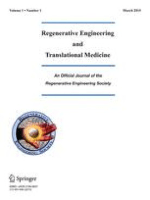
Journal of Biological Engineering
metrics 2024
Connecting Scholars to Drive Biological Innovation
Introduction
Journal of Biological Engineering, published by BMC, stands as a prominent Open Access journal since 2007, dedicated to advancing the interdisciplinary field of biological engineering. With an ISSN of 1754-1611, this UK-based journal aims to provide a platform for researchers and professionals to disseminate innovative and impactful research across various domains including Biomedical Engineering, Environmental Engineering, Cell Biology, and Molecular Biology. The journal's notable rankings in the 2023 category quartiles exemplify its position within the scientific community, featuring Q2 status in Biomedical Engineering and Environmental Engineering, along with Q3 in Cell Biology and Q2 in Molecular Biology. By maintaining robust Scopus rankings and ensuring free access to cutting-edge research, the Journal of Biological Engineering plays a crucial role in driving discovery and collaboration among scholars, thereby enriching both the academic landscape and applied sciences.
Metrics 2024
 0.81
0.81 5.70
5.70 5.60
5.60 55
55Metrics History
Rank 2024
Scopus
IF (Web Of Science)
JCI (Web Of Science)
Quartile History
Similar Journals

Regenerative Engineering and Translational Medicine
Bridging Science and Application in HealingRegenerative Engineering and Translational Medicine is an esteemed academic journal published by Springer Heidelberg, focusing on the interdisciplinary fields of biomaterials, biomedical engineering, and cell biology. With an ISSN of 2364-4133 and an E-ISSN of 2364-4141, the journal has carved a niche for itself since its inception in 2015, showcasing cutting-edge research that bridges the gap between scientific findings and practical applications in regenerative medicine. As a recognized platform in its field, it is currently positioned within Q3 quartiles in biomaterials, biomedical engineering, and medicine (miscellaneous), with a Scopus ranking that reflects its growing influence among peers. The journal aims to disseminate high-quality, peer-reviewed articles that highlight advancements in regenerative engineering, further advancing both theoretical and applied research. Scholars and practitioners seeking to stay at the forefront of the ever-evolving landscape of regenerative health solutions will find invaluable insights and innovations within these pages. Join a community of leading thinkers and explore the journal's comprehensive research contributions, which are crucial for fostering partnerships between academia and industry in the quest for transformative medical solutions.

MOLECULAR AND CELLULAR BIOLOGY
Advancing the Frontiers of Molecular DiscoveryMOLECULAR AND CELLULAR BIOLOGY, published by TAYLOR & FRANCIS INC, stands as a preeminent platform for researchers, professionals, and students engaged in the dynamic field of molecular and cellular biology. Established in 1981 and ongoing into 2024, the journal features cutting-edge research that spans across vital sub-disciplines, garnering a strong impact in its contributions to the scientific community. With an impressive Q2 ranking in Cell Biology and Q1 ranking in Molecular Biology for 2023, it consistently publishes high-quality articles that reflect the latest advancements and discoveries within the field. The journal is particularly well-regarded for its rigorous peer-review process and commitment to scientific excellence, making it an invaluable resource for those seeking to deepen their understanding of molecular mechanisms and cellular processes. Although not open access, the journal offers diverse access options for researchers to reach the latest findings. By maintaining a strong focus on biochemistry, genetics, and molecular biology, MOLECULAR AND CELLULAR BIOLOGY remains essential reading for anyone looking to contribute to or stay informed about significant developments within this pivotal area of study.

Synthetic and Systems Biotechnology
Connecting Disciplines for Revolutionary InsightsSynthetic and Systems Biotechnology, published by KEAI PUBLISHING LTD, is a pioneering open-access journal that has made significant contributions to the fields of applied microbiology, biotechnology, biomedical engineering, genetics, and structural biology since its inception in 2016. With an ISSN of 2405-805X, this journal is committed to fostering innovative research and interdisciplinary collaboration, providing a platform for the dissemination of high-quality studies that push the boundaries of scientific knowledge. Recognized for its excellence, it holds prestigious Q1 rankings in both Applied Microbiology and Biotechnology as well as Biomedical Engineering in 2023, alongside notable Q2 rankings in Genetics and Structural Biology. Researchers, professionals, and students alike can access cutting-edge research that explores the dynamic interplay between synthetic biology and systems biology, driving advancements that could reshape health, industry, and environmental sustainability. By operating under an open-access model, Synthetic and Systems Biotechnology ensures that new findings are accessible to a global audience, thereby maximizing the impact and reach of the published work and paving the way for future discoveries.

Annual Review of Biomedical Engineering
Catalyzing Interdisciplinary Insights in Biomedical EngineeringAnnual Review of Biomedical Engineering, published by Annual Reviews, stands as a leading academic journal dedicated to the rapidly evolving field of biomedical engineering. With an impressive impact factor that reflects its high citation rates and rigorous peer-review process, this journal offers critical insights by synthesizing cutting-edge advancements and applications in both biomedical engineering and miscellaneous medicine. The journal, which is available in both print (ISSN: 1523-9829) and electronic formats (E-ISSN: 1545-4274), serves as an essential resource for researchers, professionals, and students aiming to stay abreast of significant developments and emerging trends. As of 2023, it is recognized in the top tier (Q1) for both Biomedical Engineering and Medicine, showcasing its esteemed position within the academic community, reflected in its high Scopus rankings. Spanning from 1999 to 2024, the Annual Review of Biomedical Engineering continues to catalyze interdisciplinary collaboration and innovation at the intersection of engineering and healthcare.

Current Opinion in Biomedical Engineering
Connecting experts for innovative biomedical solutions.Current Opinion in Biomedical Engineering is a renowned journal published by Elsevier, focusing on the cutting-edge developments and critical assessments in the fields of biomedical engineering and related disciplines. With an ISSN of 2468-4511, it provides a valuable platform for researchers and professionals to disseminate their insights and discoveries in areas such as bioengineering, biomaterials, and medicine. Its impressive impact factor positions it in the Q2 category for several fields, including Bioengineering and Biomedical Engineering, highlighting its influence and relevance in ongoing scientific dialogues. The journal’s unique format of opinion pieces and reviews encourages innovative thinking and fosters collaboration among experts. As an essential resource for those engaged in the life sciences and engineering, Current Opinion in Biomedical Engineering serves to stimulate discussion, promote knowledge exchange, and drive advancements in biomedical applications. Set in the Netherlands at Radarweg 29, 1043 NX Amsterdam, the journal is accessible through various academic platforms, enabling a global readership to engage with the latest scholarly work in this dynamic field.

Journal of Tissue Engineering and Regenerative Medicine
Cultivating knowledge at the intersection of engineering and biology.Journal of Tissue Engineering and Regenerative Medicine, published by WILEY, stands as a pivotal platform in the fields of biomaterials, biomedical engineering, and regenerative medicine. With an ISSN of 1932-6254 and an E-ISSN of 1932-7005, this journal, based in the United Kingdom, has consistently delivered high-quality research since its inception in 2006, converging critical insights through 2024. With an impressive citation profile reflected in its Scopus rankings—specifically a rank of #58 in Medicine and #75 in Biomedical Engineering—the journal is acknowledged for its substantial impact, as demonstrated by its competitive quartile standings in 2023. Notably, it maintains a Q3 ranking in Biomaterials and Q2 in both Biomedical Engineering and Medicine (miscellaneous), showcasing its influence and relevance in the rapidly evolving interplay between engineering and medicine. The journal serves as a vital resource for researchers and practitioners aiming to stay abreast of innovations and breakthroughs in regenerative therapies, tissue scaffolds, and biomaterials. While not an open-access publication, it fosters academic dialogue and knowledge dissemination that is crucial for advancing the field.

BIOTECHNOLOGY ADVANCES
Connecting Researchers to the Heart of BiotechnologyBIOTECHNOLOGY ADVANCES is a premier, peer-reviewed journal published by PERGAMON-ELSEVIER SCIENCE LTD, dedicated to advancing knowledge in the rapidly evolving fields of biotechnology and bioengineering. With an ISSN of 0734-9750 and an E-ISSN of 1873-1899, this esteemed journal covers a wide spectrum of topics relevant to applied microbiology, molecular biology, and biochemical innovation. Recognized for its academic rigor, it holds a distinguished position in the top quartile (Q1) in multiple categories, including Applied Microbiology and Biotechnology, Bioengineering, and Biotechnology, further evidenced by its high rankings in Scopus, where it ranks #3/127 in Applied Microbiology and Biotechnology and #7/311 in Biotechnology. Researchers and professionals in the field value the journal not only for its comprehensive coverage of cutting-edge research but also for its commitment to disseminating critical findings and fostering collaboration. While BIOTECHNOLOGY ADVANCES currently operates under a subscription model, its potential impact on future innovations in biotechnology cannot be overstated, making it an essential resource for anyone interested in the forefront of biotechnological advancements.

Cell Stem Cell
Unraveling the Mysteries of Stem Cells for a Healthier TomorrowCell Stem Cell, published by CELL PRESS, is a premier journal at the forefront of cellular biology, genetics, and molecular medicine. With an esteemed impact factor and recognized as a Q1 journal in multiple categories including Cell Biology, Genetics, and Molecular Medicine, it offers researchers, professionals, and students rigorous, peer-reviewed articles that shape the future of stem cell research and regenerative medicine. Located in Cambridge, MA, this journal has become an invaluable resource since its inception in 2007 and is committed to disseminating groundbreaking findings that drive innovation and understanding in these critical fields. By consistently ranking within the top percentile of its categories in Scopus, Cell Stem Cell remains an essential platform for scholarly communication, fostering collaboration among leading scientists worldwide. Although the journal does not currently offer open access options, its comprehensive insights are pivotal for anyone engaged in the study of stem cells and their applications.

Cellular and Molecular Bioengineering
Innovating at the Intersection of Biology and TechnologyCellular and Molecular Bioengineering, published by SPRINGER, is a prominent journal dedicated to the exploration of interdisciplinary approaches in the fields of biochemistry, genetics, and molecular biology. With an ISSN of 1865-5025 and an E-ISSN of 1865-5033, this journal has been a pivotal resource since its inception in 2009, showcasing groundbreaking research that combines innovative modeling and simulation techniques with cellular and molecular applications. As a Q2 journal in both Biochemistry, Genetics and Molecular Biology (miscellaneous) and Modeling and Simulation categories, it ranks favorably in the Scopus metrics, placing 62nd out of 324 in Mathematics_ Modeling and Simulation, and 69th out of 221 in General Biochemistry, Genetics and Molecular Biology. The journal's commitment to quality research and its contribution to advancing academic dialogue make it essential for researchers, professionals, and students seeking to stay at the forefront of bioengineering innovation. While it currently does not offer open access, it continues to provide significant insights and empirical studies that can help shape future developments in the field, reinforcing its role as a key player in cellular and molecular bioengineering.

Advanced Biology
Empowering Science Through Rigorous Peer ReviewAdvanced Biology, published by WILEY-V C H VERLAG GMBH, serves as a premier platform where innovative research and scientific breakthroughs in the fields of biochemistry, genetics, and molecular biology converge. Established in 2021, this journal has rapidly ascended to prominence, securing Q1 rankings in its primary categories, including general biochemistry and biomedical engineering, and a solid Q2 ranking in biomaterials. With an ISSN of 2701-0198 and an emphasis on open access, Advanced Biology ensures that rigorous peer-reviewed research is accessible to a global audience, enhancing visibility and fostering collaboration among researchers, professionals, and students alike. By 2024, it aims to continually elevate scientific understanding and innovation, catering to the growing interdisciplinary nature of these critical fields. With Scopus rankings placing it amongst the top quartiles in its disciplines, Advanced Biology is poised to make significant contributions to the future of life sciences.